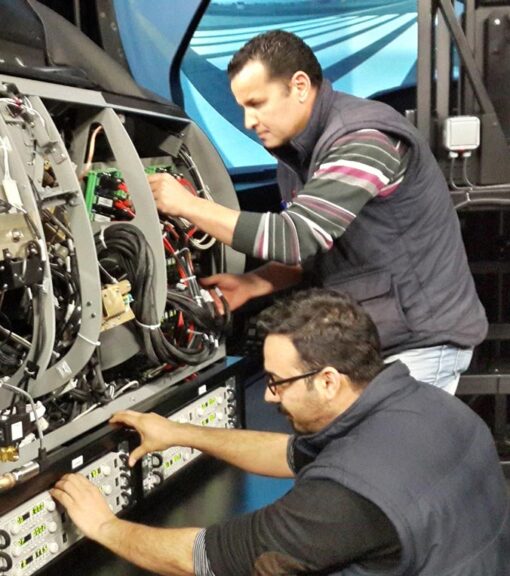
Simulator Modernization program
Quantum3D Government System can provide a comprehensive evaluation of your current simulator to provide valuable insight into its current condition. We will evaluate the condition, performance, and quality of all simulator components and work with you to develop a customized upgrade plan that meets your budget and training requirements.
Features and Benefits
Image Generator Upgrade
• Quantum3D will replace the old, existing Image Generator with a latest generation IDX Series IG, including state-of-the-art graphics cards and hardware
• New high-resolution visual and sensor databases can be developed, providing more realistic and accurate scene content
• New airports and AOIs can be generated using high-resolution models and imagery to take advantage of the IG upgrade
• New 3D models will be used to provide more realism and fidelity for both visual (OTW) and sensor views
• New weather, lighting, atmospherics, and special effects models will be used for increased realism
Display System Upgrade
• New projectors or monitors will be provided for increased resolution, clarity, brightness and contrast
• New Auto calibration, alignment, warp, and blend systems
• Cleaning and reconditioning of the display surface
Control System Upgrade
• New Flight models integrated into the simulator for increased realism of flight dynamics (when appropriate)
• New Cockpit displays (if needed)
New Regulatory Compliance and Recertification
Ensure that all of the new simulator components and software changes meet the existing certification requirements, or if higher level certification is desired, Quantum3D will ensure that all of the components and software upgrades are in compliance with the latest certification requirements
Instructor-Operator Station & After-Action Review Upgrade
New IOS and AAR systems can be implemented to provide new training scenarios and increased awareness into training effectiveness
Relocation of Current Simulator
Relocation of the simulator to new training facility or to a new location with the current building, if required
Outdated Simulator Components – Common Problem Areas
Image GEnerator
• Unrealistic visual scene due to outdated graphics system
• Limited number of cultural features in the scene
• Poor weather and atmospheric effects
• Out of date (and often unrealistic) sensor representations
Image IOS & AAR System
• Old IOS & AAR systems lack the functionality and benefits of newer systems
• Limited number of training scenarios that can be used
Control System
• User Interfaces may be out of date and not representative of aircraft
• Flight Models may be out of date and not representative of aircraft
Display System
• Old CRT displays costly to maintain with increasing failure rates
• Old displays with limited contrast, limited color and limited brightness
• Old displays have lower resolution resulting in negative training for target detection and identification
• Parts for old display systems are becoming obsolete
• Reduced reliability and increased maintenance costs
• Old display systems have manual alignment, newer display systems are automated
Regulatory Compliance
Legacy Simulator not in compliance with newer FAA and other certifications
Customer Benefits
• Higher fidelity of training because of the greater clarity and accuracy of the visual scenes. Also removes and potential for negative training due to more realistic visual content.
• New physics models provide more accurate sensor representations
• New display technology provides increased contrast, color range, brightness and fidelity
• New data packages to increase the accuracy and quality of the simulation and ensure its compliance with new regulations
• New network/communication protocols (e.g. CIGI, HLA, DIS) for joint training and exercise control
• Improved reliability across the entire simulator
• Minimal downtime due to failing components
• Easier and less costly maintenance
• Obsolescence can be managed, enabling subsequent updates to be integrated more cost-effectively
• Reduced overall operating costs with newer technologies
• Reduced footprint of simulator
• Service life of the simulator can be extended for many more years
• Potential for re-sale and training revenue value can be increased and protect the initial investment in the simulator
• Compliance with new regulatory requirements

